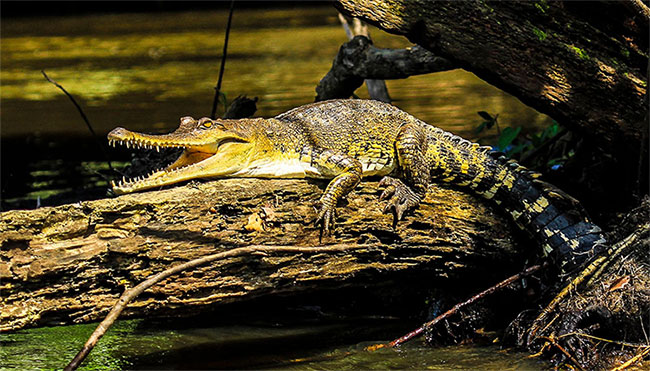Scientists discovered new crocodiles in Central Africa
Scientists have announced the discovery of a completely new species of crocodile in Central Africa.
In fact, this crocodile species formerly known as Mecistops leptorhynchus was classified in the same category as another crocodile in West Africa. However, after a long period of research, scientists have identified Mecistops leptorhynchus as a separate species. This information has just been published in ZooTaxa magazine.

This is said to be a new crocodile species named scientific Mecistops leptorhynchus.
This information is important because the recognition of Mecistops leptorhynchus as a separate crocodile also means reducing the number of crocodiles in West Africa. Meanwhile, the species Mecistops leptorhynchus was determined to live only in nature for about 500 animals.
The difference in the skull of Mecistops leptorhynchus makes scientists decide to subspecies this species into a separate species. Before that, from 1835 it still had to be 'home' with another species in West Africa.
Encountered in areas from Cameroon to Tanzania, scientists believe that the new species may appear about 8 million years ago. At that time, when volcanic activity was intense, creating a mountain range in and around Cameroon today divides indigenous creatures.
In order to provide a valid basis, scientists have spent a lot of effort collecting samples related to the crocodile Mecistops leptorhynchus.
In fact, the designation of a new species for the crocodile Mecistops leptorhynchus will help conservationists better protect them while at risk of extinction.
Currently, scientists are promoting a partnership with the West African government to develop a breeding and conservation program for the crocodile Mecistops leptorhynchus.
- Interesting things about crocodiles
- Crocodile reveals the Earth's climate conditions millions of years ago
- Heavy rain helps tens of thousands of crocodiles to live
- Fossils discovered 5 crocodile species 100 million years
- The secret of hunting crocodiles
- The longest live crocodile in the world
- Reckless close to giant crocodiles for 15 years
- Ancient crocodiles are vegetarian animals
- Crocodile eating Nile people appear in America
- Through 6 million years of evolution,
- Crocodiles are torn by lions because they dare to loot their lures
- Discover the unique red-necked bird
 Animal 'suffering' after hibernation
Animal 'suffering' after hibernation Why do goats climb well?
Why do goats climb well? Scientists were surprised to see chimpanzees eating turtles
Scientists were surprised to see chimpanzees eating turtles Giant catfish died deadly due to drought in Thailand
Giant catfish died deadly due to drought in Thailand Four new species appear as 'hybrids' of extraterrestrial creatures
Four new species appear as 'hybrids' of extraterrestrial creatures  Strange species in Southeast Asia becomes the first marine fish species 'extinct due to humans'
Strange species in Southeast Asia becomes the first marine fish species 'extinct due to humans'  Ancient humans may still live on Indonesia's Flores island
Ancient humans may still live on Indonesia's Flores island  The 'dragon' species that was thought to only exist in myths is one of the rarest on the planet.
The 'dragon' species that was thought to only exist in myths is one of the rarest on the planet.  How many animals have ever existed on Earth?
How many animals have ever existed on Earth?  Treasure of Southeast Asia: Rare animal species found in only 9 countries in the world, Vietnam just received good news!
Treasure of Southeast Asia: Rare animal species found in only 9 countries in the world, Vietnam just received good news! 